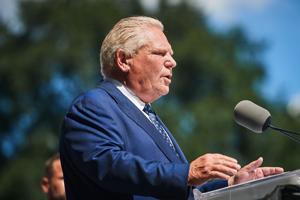Politics
Food Prices Remain Stable Despite Tariff Concerns in North America

Consumers across North America have been observing an unexpected stability in food prices despite ongoing tariffs. Many anticipated significant increases following the imposition of tariffs, particularly during the Trump administration, yet grocery bills have not surged as expected. According to economist John Rapley and other experts, this calm could be misleading.
In Canada, food inflation was recorded at a moderate 2.8% in June 2023, notably higher than the overall inflation rate of 1.9%, as reported by Statistics Canada. Although food inflation has decreased from 3.8% earlier in the year, the pace of decline is slowing, indicating that food prices are still outpacing general inflation, albeit at a narrowing margin.
The situation is similarly evident in the United States, where the U.S. Consumer Price Index rose by 2.7% year-over-year in June, while food prices increased by approximately 3%. The prices of grocery items matched this rate, and meals at restaurants experienced an even sharper rise. Specific commodities such as beef, coffee, and citrus fruits showed month-over-month increases exceeding 2%, highlighting mounting price pressures.
A prevalent assumption suggests that if tariffs have not yet led to higher prices, they likely will not in the future. However, food inflation does not adhere to a predictable timeline. The current lull could foreshadow a delayed financial impact on households, potentially striking when consumers are least prepared.
Former President Donald Trump previously urged large retailers like Walmart to “eat up tariffs,” implying that these giants could absorb costs indefinitely. Yet, such strategies are not sustainable. Rising input and inventory costs are bound to permeate through the supply chain. In anticipation of new duties, importers often stockpile goods, resulting in warehouses filled with tariff-free inventory, including cheaper ingredients and packaging. Retailers may initially absorb these costs to remain competitive, delaying price increases.
However, this strategy cannot last indefinitely. As inventories deplete, retailers will have to replenish with more expensive goods, leading to abrupt price hikes. For instance, a product priced at $4.99 may suddenly cost $5.69. Such sudden increases, while seemingly minor, gradually erode consumer trust and can lead to frustration directed at grocers, suppliers, or policymakers.
The disparity between general inflation and the cost of feeding a family is critical. Many retailers still depend on pre-tariff inventories, but this buffer is quickly diminishing.
In addition to these complexities, the so-called “uncertainty tax” plays a crucial role. Due to unpredictable statements from Trump and erratic trade policies, many food companies are pricing in the risk of higher tariffs to protect their margins, ironically resulting in higher costs for consumers. This form of inflation—delayed and poorly understood—poses significant challenges for central banks. It is not driven by excessive demand but rather by disrupted supply chains.
Interest rate hikes alone will not rectify trade disruptions. If consumer expectations shift—possibly leading to panic buying or demands for higher wages—the inflationary cycle may become self-perpetuating.
In Canada, the implications could be even more profound. The country’s food system relies heavily on imported inputs such as fertilizers, animal feed, and specialty ingredients, making it vulnerable to U.S. trade policy changes. Should Washington impose stricter tariffs on countries like China or Mexico, the resultant cost shocks could ripple through Canadian supply chains without warning.
While Canada has experienced a moderation in food inflation, this should not be interpreted as a definitive victory. The delayed effects of tariffs and the false sense of security they create could lead to complacency among consumers and officials alike. In economics, timing is crucial, and in the food sector, it can mean the difference between affordability and anxiety.
Dr. Sylvain Charlebois serves as the Director of the Agri-Food Analytics Lab at Dalhousie University and is a co-host of The Food Professor Podcast. Currently, he is a visiting scholar at McGill University in Montreal.
-

 World3 months ago
World3 months agoScientists Unearth Ancient Antarctic Ice to Unlock Climate Secrets
-

 Entertainment3 months ago
Entertainment3 months agoTrump and McCormick to Announce $70 Billion Energy Investments
-

 Lifestyle3 months ago
Lifestyle3 months agoTransLink Launches Food Truck Program to Boost Revenue in Vancouver
-

 Science3 months ago
Science3 months agoFour Astronauts Return to Earth After International Space Station Mission
-

 Technology2 months ago
Technology2 months agoApple Notes Enhances Functionality with Markdown Support in macOS 26
-

 Top Stories1 week ago
Top Stories1 week agoUrgent Update: Fatal Crash on Highway 99 Claims Life of Pitt Meadows Man
-

 Sports3 months ago
Sports3 months agoSearch Underway for Missing Hunter Amid Hokkaido Bear Emergency
-

 Politics2 months ago
Politics2 months agoUkrainian Tennis Star Elina Svitolina Faces Death Threats Online
-

 Technology3 months ago
Technology3 months agoFrosthaven Launches Early Access on July 31, 2025
-

 Politics3 months ago
Politics3 months agoCarney Engages First Nations Leaders at Development Law Summit
-

 Entertainment3 months ago
Entertainment3 months agoCalgary Theatre Troupe Revives Magic at Winnipeg Fringe Festival
-

 Politics1 week ago
Politics1 week agoShutdown Reflects Democratic Struggles Amid Economic Concerns



















